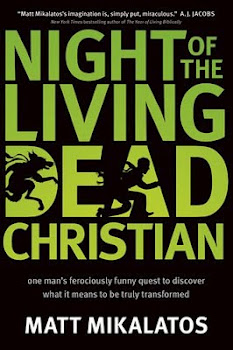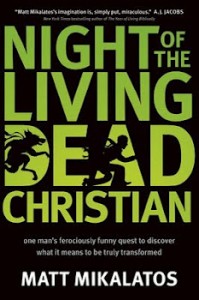
by Jason Joyner | Apr 4, 2012 | Blog, humor, what are you laughing at, writing craft, Writing Wednesday
 |
| LOLZ! So funny! |
Last week I was part of a blog tour for the book Night of the Living Dead Christian by Matt Mikalatos. One aspect of the book that was always brought out was its humor in the way it dealt with serious issues of faith. Matt’s sense of humor didn’t resonate with everyone, but everyone recognized it was a valid device to get points across.
So how do we make others laugh in our writing?
I am writing a suspense. I hope it is suspenseful. I hope it keeps people turning the pages. But I also want there to be some laughs in the midst of it. Not only do I enjoy that type of writing, I think it helps control the mood. If a writer can disarm a reader with a laugh at one point and hit them with a gut punch of drama later on, the reader has more of an emotional ride from it.
I’m the type that really enjoys laughing. My favorite writing combines suspense, good characterization, and a sense of humor. Some of my favorite authors are James Scott Bell, Tim Downs, and Rene Gutteridge. They are all known for a clever or witty voice. Even in a serious book, they have moments where the reader is disarmed by a funny comment or piece of dialogue. Heck,
I read the romance Save the Date by Jenny B. Jones because of her humerous writing.
I try to do that in my own writing. I like to find the little surprise or twist that catches people off guard. I don’t know if it is working, but if it makes me smile after reading it over again, my feeling is it has potential.
What do you think? Do you try for humor in your writing? If so, how do you go about putting the funny in there?
—

by Jason Joyner | Apr 4, 2012 | Blog, humor, what are you laughing at, writing craft, Writing Wednesday
 |
| LOLZ! So funny! |
Last week I was part of a blog tour for the book Night of the Living Dead Christian by Matt Mikalatos. One aspect of the book that was always brought out was its humor in the way it dealt with serious issues of faith. Matt’s sense of humor didn’t resonate with everyone, but everyone recognized it was a valid device to get points across.
So how do we make others laugh in our writing?
I am writing a suspense. I hope it is suspenseful. I hope it keeps people turning the pages. But I also want there to be some laughs in the midst of it. Not only do I enjoy that type of writing, I think it helps control the mood. If a writer can disarm a reader with a laugh at one point and hit them with a gut punch of drama later on, the reader has more of an emotional ride from it.
I’m the type that really enjoys laughing. My favorite writing combines suspense, good characterization, and a sense of humor. Some of my favorite authors are James Scott Bell, Tim Downs, and Rene Gutteridge. They are all known for a clever or witty voice. Even in a serious book, they have moments where the reader is disarmed by a funny comment or piece of dialogue. Heck,
I read the romance Save the Date by Jenny B. Jones because of her humerous writing.
I try to do that in my own writing. I like to find the little surprise or twist that catches people off guard. I don’t know if it is working, but if it makes me smile after reading it over again, my feeling is it has potential.
What do you think? Do you try for humor in your writing? If so, how do you go about putting the funny in there?
—

by Jason Joyner | Mar 28, 2012 | Blog, books, CSFF, Matt Mikalatos, monsters, Night of the Living Dead Christian, Writing Wednesday, zombies
We’ve come to the darkness.
I’ve challenged people if they have what it takes to read Night Of The Living Dead Christian. I’ve explained the book (as best I can) and asked people to share their inner monster. What is the point of all of this monster lore, and how does it relate to Christianity?
Matt Mikalatos wrote a funny book to make the medicine go down better. He’s a smiling Mary Poppins. But we need to see that as Christians, we often have a monster form that we take.
What is a monster? Generally it is anything outside of the norm for a creature. Whether it is a cross of types (like a werewolf or Sasquatch) or a perverted form (vampire, zombie), it is a recognition that something is not right. The person is not who they seem to be.
How many Christians can attest to the fact they don’t live up to the transformed life that we are supposed to have in Christ? How many of us are comfortable admitting that even though we have the Holy Spirit dwelling with us, we wrest control and try to make our lives something of our own?
We live in delusion if we don’t see that there are monsters we each battle.
Matt manages to use this as an allegory on helping us to find transformation in the blood of Jesus, and nothing more.
The zombies in his story are Christians who have mindlessly followed a leader and have no life in themselves, thus becoming undead. The vampire Lara was wounded by her ex-husband so much that she had to start stealing life from others to feel alive. Luther the werewolf realizes that he has an animal side with lusts of the flesh he can’t control. One of the tragic moments in the book is when Luther dresses up very nice and meets with his estranged wife. Only his tail is showing, his teeth are long, and his fur has to be brushed. He tries to accept the wolf part of him and dress it up as acceptable.
Needless to say, it doesn’t go well.
How many of us have tried to deny the animal desires, only to fail when we are tired, stressed, or challenged by a strong temptation?
Thus the monster motif is a perfect vehicle for challenging Church, Christians, and ultimately ourselves. Before I read Night I preached a sermon last October called “Escaping the Zombie Life.” In going for a catchy opening, I ended up using a zombie theme throughout the message discussing how Paul identifies our struggles to be holy in Romans 7, and how dying to ourselves and walking in the life of the Spirit in Romans 8 is the answer if we can remember to die each day. Matt takes a similar idea and runs with it in a way that convicts and entertains.
This book is not for everyone. People need a certain sense of humor to really get into it. It fits me to a tee, but someone who has a different humor or are too serious may not appreciate it. It appeals to a younger demographic that is used to The Walking Dead and the Twilight phenomena, but that doesn’t mean older people can’t enjoy it. It is a novel, but not quite. It is a spoof-y (is that a word) Pilgrim’s Progress.
It is a book that has a powerful message in a tortilla wrap of fun (it is close to lunch, sorry).
And for those who commented yesterday in my monster quiz and want to know what kind of monster I am? I’m part mad scientist/part cyborg with a little dash of lyncanthropy for some zing. I can trust too much in my intelligence, I can be cold to what people feel at times, and I can’t always keep the beast tamed on my own.
It is not fun to admit, but it does help me recognize that I have a need for a Savior that does not end with a prayer or by Sunday perfect attendance. It is daily saying to Jesus, as Matt’s werewolf friend does in the book, “I am Your servant.”
—
There’s more at Becky Miller’s blog, where she updates all posts for the tour. Hurry on over and see what others are saying.
Also, I should disclose that I was sent a review copy from the publisher. Any and all silliness is solely my own.
—

by Jason Joyner | Mar 28, 2012 | Blog, books, CSFF, Matt Mikalatos, monsters, Night of the Living Dead Christian, Writing Wednesday, zombies
We’ve come to the darkness.
I’ve challenged people if they have what it takes to read Night Of The Living Dead Christian. I’ve explained the book (as best I can) and asked people to share their inner monster. What is the point of all of this monster lore, and how does it relate to Christianity?
Matt Mikalatos wrote a funny book to make the medicine go down better. He’s a smiling Mary Poppins. But we need to see that as Christians, we often have a monster form that we take.
What is a monster? Generally it is anything outside of the norm for a creature. Whether it is a cross of types (like a werewolf or Sasquatch) or a perverted form (vampire, zombie), it is a recognition that something is not right. The person is not who they seem to be.
How many Christians can attest to the fact they don’t live up to the transformed life that we are supposed to have in Christ? How many of us are comfortable admitting that even though we have the Holy Spirit dwelling with us, we wrest control and try to make our lives something of our own?
We live in delusion if we don’t see that there are monsters we each battle.
Matt manages to use this as an allegory on helping us to find transformation in the blood of Jesus, and nothing more.
The zombies in his story are Christians who have mindlessly followed a leader and have no life in themselves, thus becoming undead. The vampire Lara was wounded by her ex-husband so much that she had to start stealing life from others to feel alive. Luther the werewolf realizes that he has an animal side with lusts of the flesh he can’t control. One of the tragic moments in the book is when Luther dresses up very nice and meets with his estranged wife. Only his tail is showing, his teeth are long, and his fur has to be brushed. He tries to accept the wolf part of him and dress it up as acceptable.
Needless to say, it doesn’t go well.
How many of us have tried to deny the animal desires, only to fail when we are tired, stressed, or challenged by a strong temptation?
Thus the monster motif is a perfect vehicle for challenging Church, Christians, and ultimately ourselves. Before I read Night I preached a sermon last October called “Escaping the Zombie Life.” In going for a catchy opening, I ended up using a zombie theme throughout the message discussing how Paul identifies our struggles to be holy in Romans 7, and how dying to ourselves and walking in the life of the Spirit in Romans 8 is the answer if we can remember to die each day. Matt takes a similar idea and runs with it in a way that convicts and entertains.
This book is not for everyone. People need a certain sense of humor to really get into it. It fits me to a tee, but someone who has a different humor or are too serious may not appreciate it. It appeals to a younger demographic that is used to The Walking Dead and the Twilight phenomena, but that doesn’t mean older people can’t enjoy it. It is a novel, but not quite. It is a spoof-y (is that a word) Pilgrim’s Progress.
It is a book that has a powerful message in a tortilla wrap of fun (it is close to lunch, sorry).
And for those who commented yesterday in my monster quiz and want to know what kind of monster I am? I’m part mad scientist/part cyborg with a little dash of lyncanthropy for some zing. I can trust too much in my intelligence, I can be cold to what people feel at times, and I can’t always keep the beast tamed on my own.
It is not fun to admit, but it does help me recognize that I have a need for a Savior that does not end with a prayer or by Sunday perfect attendance. It is daily saying to Jesus, as Matt’s werewolf friend does in the book, “I am Your servant.”
—
There’s more at Becky Miller’s blog, where she updates all posts for the tour. Hurry on over and see what others are saying.
Also, I should disclose that I was sent a review copy from the publisher. Any and all silliness is solely my own.
—

by Jason Joyner | Mar 21, 2012 | BioWare, Blog, Mass Effect 3, stick that ending, writing craft, Writing Wednesday
So, remember my last writing post from a week ago?
I talked about looking for good stories in any medium and learning from them. My specific example was the Mass Effect video game series from BioWare. For entertainment and thought-provoking story, I have never seen a video game like Mass Effect 3.
And then I finished the game.
[SPOILER ALERT]
*crickets chirped*
Almost literally, it seemed like that happened. I didn’t get it. I didn’t see that coming. The ending of the game, and of a five year, three game-spanning story, didn’t make sense. I sat in my living room, thinking “Huh?”
There is a lot of talk on game websites about this, and don’t even try to find a impartial opinion on the BioWare forums. I’ve seen long analyses trying to prove some theory or another from passionate gamers. Some say there is a point to the ending and it is so genius only the truly enlightened get it (kidding).
Well, this isn’t a game post. It is a writing post. What is the writing lesson to take from this?
 |
| Remeber this? If not, I’m getting old. |
You’ve got to stick the ending.
Your writing can be brilliant. The prose can sparkle and move a reader to tears. The characters seem like living people you want to go get a beer with afterwards. The plot can shock and amaze with the suspense and tension. It can be the new Great American Novel…
As long as you nail the finish.
My disclaimer: I haven’t finished my novel yet. I have not proven that I can stick it. But I know not sticking it when I see it.
- a deus ex machina that comes from nowhere
- new ideas that were never foreshadowed, or only fainly done
- a new character at the last minute who is very important
- contradicting established character traits or identities
- convenient glowing God-child telling the protagonist to do something wacky (this last one is a little more specific to ME3)
Writing a novel is hard. It takes skill and dedication to see an imagined world through to the end. Let it end well. Make sure you don’t lose focus.
The Matrix was remarkable when it came out back in 1999. Then came The Matrix Reloaded and everybody did a double-take. It sullied the first movie. Same with the Pirates Of The Caribbean movies – the first one is widely loved, the second one was a little iffy, and the third was “what was the writer and director smoking?”
The Mass Effect story from 1 through 3 should take an average gamer 120 hours to finish (I know, sad). For 119.75 hours it was awesome. The last 15 minutes was like a plane crashing on the tarmac after a long, successful journey.
My take-home lesson: look very carefully at how I’m ending. If I’m taking the reader for a ride, I want them to get to their destination. I’m not saying the ending has to be happy or can’t be tragic, but it can’t feel like the tail of the plane ripped off, sucking the poor reader out into the atmosphere.
What about you? Have you read a book or seen a movie that was great all the way until the ending? Share your examples so we can all learn from them!
—

by Jason Joyner | Mar 21, 2012 | BioWare, Blog, Mass Effect 3, stick that ending, writing craft, Writing Wednesday
So, remember my last writing post from a week ago?
I talked about looking for good stories in any medium and learning from them. My specific example was the Mass Effect video game series from BioWare. For entertainment and thought-provoking story, I have never seen a video game like Mass Effect 3.
And then I finished the game.
[SPOILER ALERT]
*crickets chirped*
Almost literally, it seemed like that happened. I didn’t get it. I didn’t see that coming. The ending of the game, and of a five year, three game-spanning story, didn’t make sense. I sat in my living room, thinking “Huh?”
There is a lot of talk on game websites about this, and don’t even try to find a impartial opinion on the BioWare forums. I’ve seen long analyses trying to prove some theory or another from passionate gamers. Some say there is a point to the ending and it is so genius only the truly enlightened get it (kidding).
Well, this isn’t a game post. It is a writing post. What is the writing lesson to take from this?
 |
| Remeber this? If not, I’m getting old. |
You’ve got to stick the ending.
Your writing can be brilliant. The prose can sparkle and move a reader to tears. The characters seem like living people you want to go get a beer with afterwards. The plot can shock and amaze with the suspense and tension. It can be the new Great American Novel…
As long as you nail the finish.
My disclaimer: I haven’t finished my novel yet. I have not proven that I can stick it. But I know not sticking it when I see it.
- a deus ex machina that comes from nowhere
- new ideas that were never foreshadowed, or only fainly done
- a new character at the last minute who is very important
- contradicting established character traits or identities
- convenient glowing God-child telling the protagonist to do something wacky (this last one is a little more specific to ME3)
Writing a novel is hard. It takes skill and dedication to see an imagined world through to the end. Let it end well. Make sure you don’t lose focus.
The Matrix was remarkable when it came out back in 1999. Then came The Matrix Reloaded and everybody did a double-take. It sullied the first movie. Same with the Pirates Of The Caribbean movies – the first one is widely loved, the second one was a little iffy, and the third was “what was the writer and director smoking?”
The Mass Effect story from 1 through 3 should take an average gamer 120 hours to finish (I know, sad). For 119.75 hours it was awesome. The last 15 minutes was like a plane crashing on the tarmac after a long, successful journey.
My take-home lesson: look very carefully at how I’m ending. If I’m taking the reader for a ride, I want them to get to their destination. I’m not saying the ending has to be happy or can’t be tragic, but it can’t feel like the tail of the plane ripped off, sucking the poor reader out into the atmosphere.
What about you? Have you read a book or seen a movie that was great all the way until the ending? Share your examples so we can all learn from them!
—




